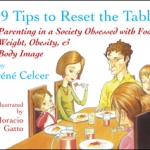 Lucy began avoiding certain foods at 14. Her mom became concerned and took her to a nutritionist. “She just wants a plan to eat healthy, I think she feels fat,” mom told the nutritionist. Lucy was happy to see a nutritionist. She began the healthy plan and began losing weight. This made her feel accomplished. When she hit the targeted weight, the nutritionist told her she had done a fantastic job and gave her a plan to maintain her current weight.
Lucy began avoiding certain foods at 14. Her mom became concerned and took her to a nutritionist. “She just wants a plan to eat healthy, I think she feels fat,” mom told the nutritionist. Lucy was happy to see a nutritionist. She began the healthy plan and began losing weight. This made her feel accomplished. When she hit the targeted weight, the nutritionist told her she had done a fantastic job and gave her a plan to maintain her current weight.
For the first time in her life, Lucy felt accepted and admired at school. She became popular. Lucy decided to lose another couple of pounds “just in case,” reasoning that then, it would be safe to eat with some abandonment and furthermore, popularity would be assured.
But, to her own surprise, Lucy did not feel any more relaxed after getting to her self-imposed target weight. In fact, she got if anything, more anxious. Lucy decided to go for another two pounds. She did but didn’t feel better either. Before she knew it, dieting became an all-consuming obsession. Every one of her behaviors was directed to restricting calorie intake. Being with friends became an impediment to dieting so she chose dieting.
Her nutritionist became concerned and asked for a meeting with her parents. She shared that Lucy has lost too much weight (even if she was still at the lowest of what it would be considered normal for her height and age.) Lucy denied that there was anything to worry about. The nutritionist advised Lucy’s parents to see a medical doctor as well as a psychotherapist.
Tips that Announce Loudly that your Child has Crossed Over into an Eating Problem
1-Your child has lost a lot of weight but seems not to notice.
2- She avoids any and all situations in which there is food.
3- His meals take place only in his room.
3- She tells you not to worry and she eats the food you send with her to school (or at least the food does not come back from school) and yet she keeps losing weight.
4- Her grades are dipping.
5- She wears long sleeves shirts in the middle of the summer.
6- During the family vacation at the beach he refuses to wear a bathing suit.
7-There are substantial changes in your son’s mood.
8-Your daughter cannot concentrate.
9- Your soon seems to forget basic information.
10- He looks thin and unhappy.
11- She seems not to care about the weight loss.
12- He tells you he is large even if you see he is skin and bones.
13- You have tried but there is no possible reasoning about the effects of losing weight.
Although, if you are lucky, your child may be able to be railed back from the edge of an eating disorder, once the eating disorder is part of his life, you have to enter the eating disorder world, which includes the medical field, and the counseling/ psychotherapy world.
More Tips for Parents
1) The disease is not your fault.
2) Eating disorders are very complex.
3) Don’t waste energy blaming yourself.
4) Invest that energy into finding resources, locally and out of your area.
5) Keep in mind that even if your child resists help, she needs it.
6) Be patient.
7) Try to carve time for the rest of the family as well.
8) Do not assume that the disease is a matter of “if you only tried harder.”
Conclusion
Once you see your teen lost a lot of weight and underwent cognitive and emotional changes you can assume that she has an eating disorder. She may diet extremely and also binge or exercise. The point is that her eating has become disordered.
At this point, if he does not need to be in an inpatient facility to restore weight, you will need a medical doctor, a psychiatrist, a nutritionist and a psychotherapist. You need to be calm and brave and know that as hard as this one is, with good care and support, many, many teens have come the other side of an eating disorder!
*Article is based on Stroeber, Michael PhD & Schneider Meg LCSW, (LifeLong Perseus Group 2006) Just a Little Too Thin. It is a Must Read for parents and professionals.
 Iréné Celcer, 56, has extensive experience working internationally with men, women, and children who suffer from obesity, body image disturbances and eating disorders. She is a regular guest at CNN where she talks about her specialties on food and disordered eating, parenting and bullying. Iréné holds graduate degrees in psychology from Universidad de Belgrano, Argentina; Holistic Psychologyfrom Antioch University, San Francisco; and Social Work from Yeshiva University, New York. She is is the author of the collection of books Hope & Will Have a Baby (Graphite Press, 2007, 2010), 99 Tips to Reset the Table: Parenting in a Society Obsessed with Food, Weight, Obesity, & Body Body Image (Graphite Press 2015). She is also the author of some books in Spanish: Mujer, Cuerpo, Dieta? La Voz de La Obsesion Women, Their Bodies & Dieting: The Voice of an Obsession (Vinciguerra 1996) and La Tirania de las Dietas/The Tyranny (Planeta 1994). She is mom to a 15 year old.
Iréné Celcer, 56, has extensive experience working internationally with men, women, and children who suffer from obesity, body image disturbances and eating disorders. She is a regular guest at CNN where she talks about her specialties on food and disordered eating, parenting and bullying. Iréné holds graduate degrees in psychology from Universidad de Belgrano, Argentina; Holistic Psychologyfrom Antioch University, San Francisco; and Social Work from Yeshiva University, New York. She is is the author of the collection of books Hope & Will Have a Baby (Graphite Press, 2007, 2010), 99 Tips to Reset the Table: Parenting in a Society Obsessed with Food, Weight, Obesity, & Body Body Image (Graphite Press 2015). She is also the author of some books in Spanish: Mujer, Cuerpo, Dieta? La Voz de La Obsesion Women, Their Bodies & Dieting: The Voice of an Obsession (Vinciguerra 1996) and La Tirania de las Dietas/The Tyranny (Planeta 1994). She is mom to a 15 year old.
